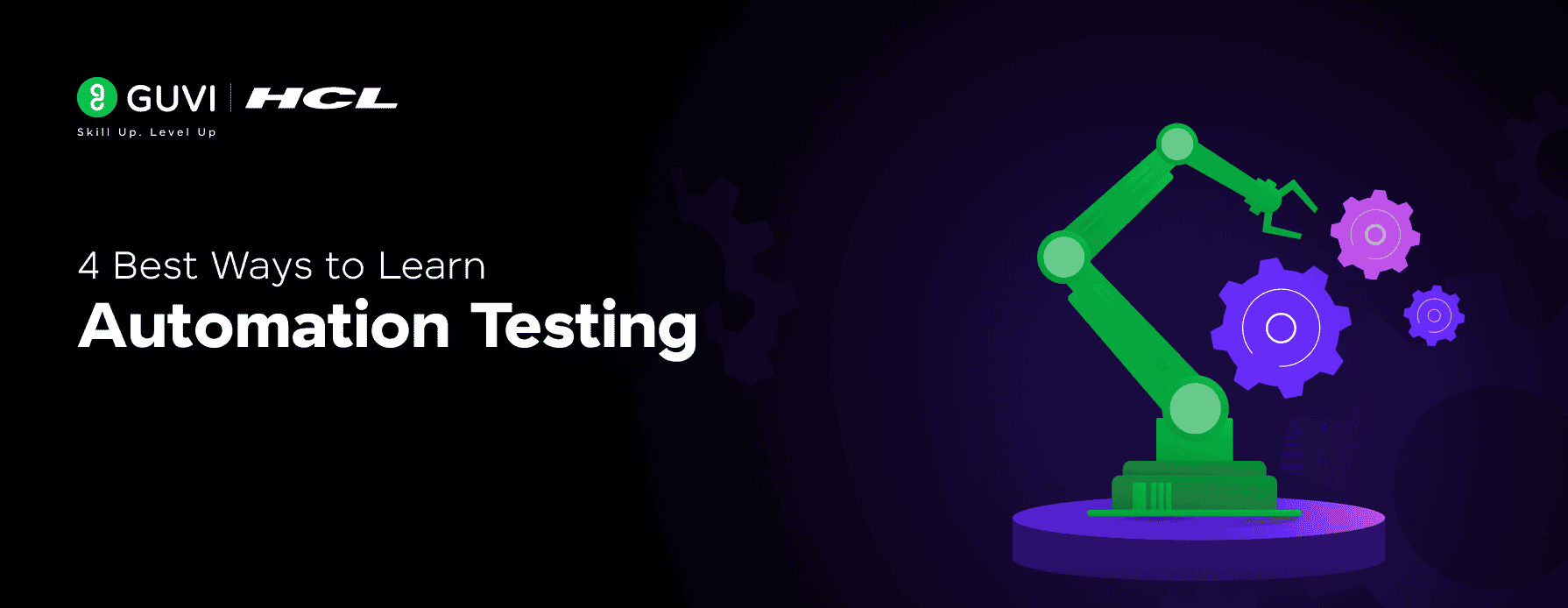
4 Best Ways to Learn Automation Testing in 2025
Oct 07, 2025 5 Min Read 5777 Views
(Last Updated)
Have you ever wondered how the world of automation testing really works and how one gets to use it to automate tasks? Are you curious about the efficiency and precision that automation brings to software quality assurance?
The world of automation testing is both expansive and dynamic providing you with limitless possibilities. For those familiar with the basics of software testing, delving into automation can significantly elevate your skill set and career prospects.
Now to make sure you learn it right, we’ve compiled a comprehensive guide outlining the most effective strategies and resources to master automation testing in today’s technological landscape. So, without further ado, let’s get started.
Table of contents
- What is Automation Testing?
- Best Resources to Learn Automation Testing
- Best Online Courses for Automation Testing
- Best Certifications for Automation Testers
- Best YouTube Channels for Automation Testers
- Best Books to Build Strong Foundations in Automation Testing
- Steps to Begin Your Automation Testing Journey
- Strengthen Your Programming Skills
- Choose the Right Automation Tools
- Enroll in Structured Courses
- Engage with the Community
- Obtain Relevant Certifications
- Conclusion
- FAQs
- Do I need programming knowledge to learn automation testing?
- Which is the best automation testing tool for beginners?
- What is the difference between Selenium and Cypress?
- How long does it take to learn automation testing?
- What is the salary of an automation tester?
What is Automation Testing?
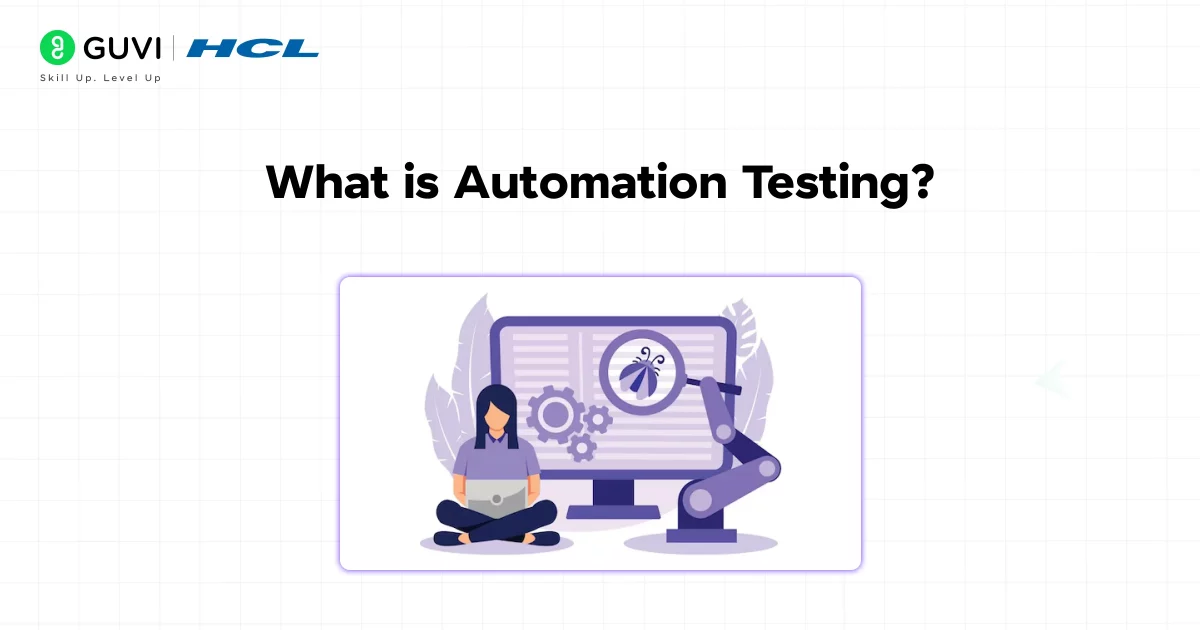
Automation testing involves the use of specialized tools and scripts to execute test cases, reducing or eliminating the need for manual intervention.
This approach ensures consistent, repeatable, and efficient testing processes, which are crucial for maintaining software quality in fast-paced development environments.
By automating repetitive and time-consuming tasks, testers can focus on more complex scenarios and edge cases, thereby enhancing overall test coverage and reliability.
Best Resources to Learn Automation Testing
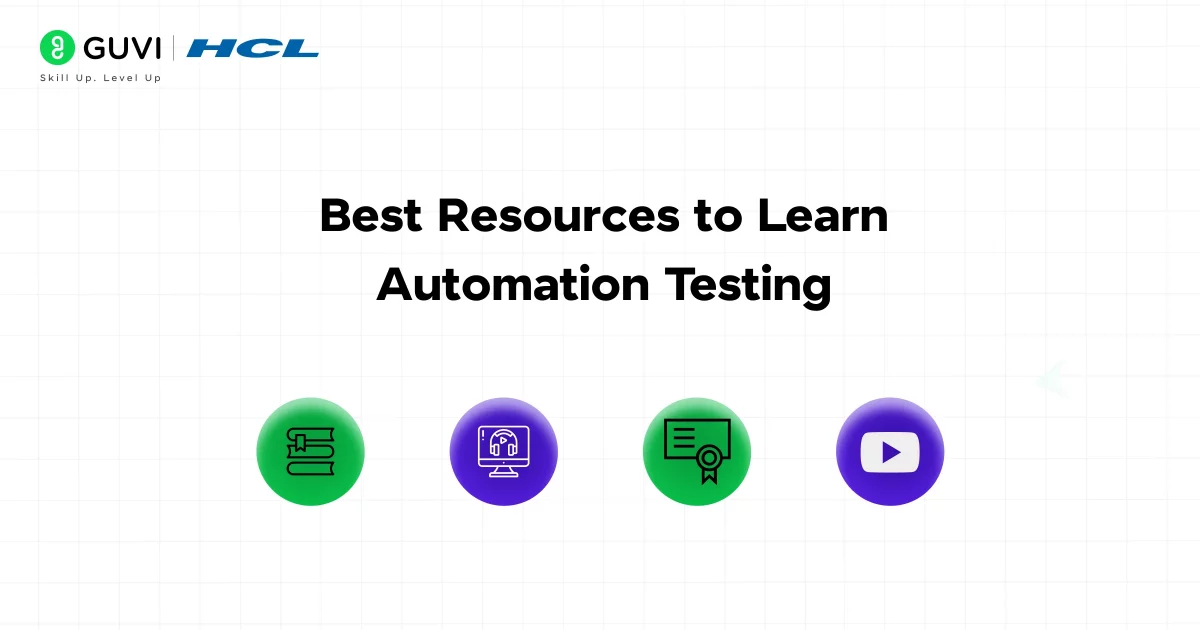
To become proficient in automation testing, it’s essential to equip yourself with both theoretical knowledge and practical skills. Below is a curated list of online courses, certifications, YouTube channels, and books to guide you:
1. Best Online Courses for Automation Testing
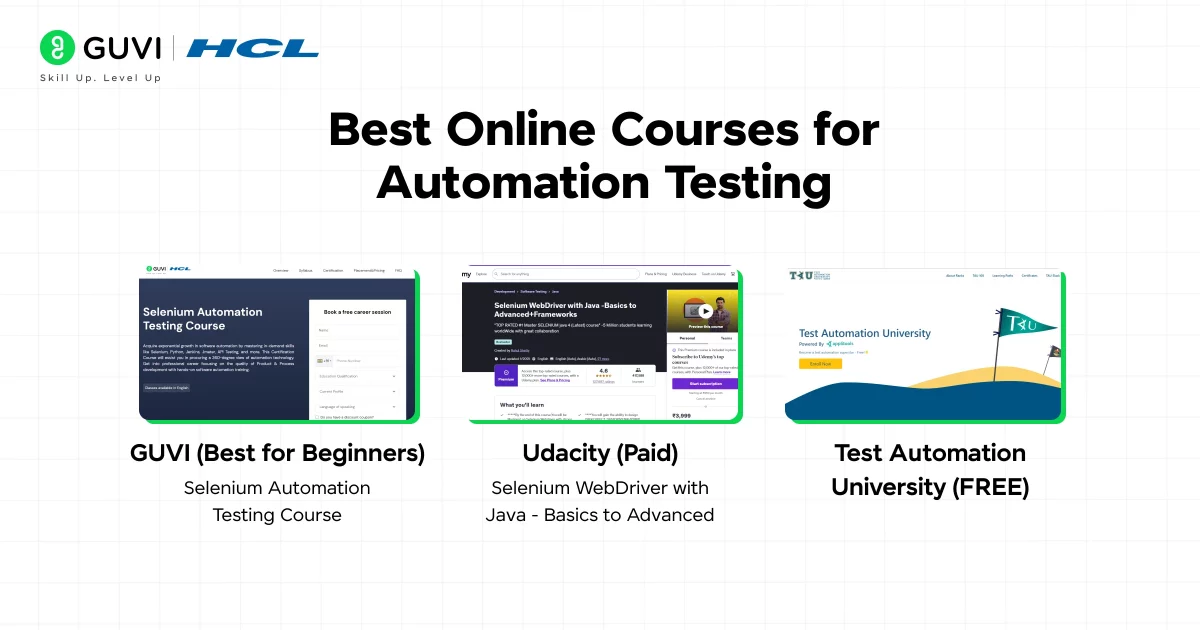
Structured courses provide a systematic approach to learning, combining theoretical concepts with hands-on practice. Here are some top-rated online courses:
a. Selenium Automation Testing Course – HCL GUVI (Best for Beginners)
This course by HCL GUVI is designed for beginners who want to start their automation testing journey with Selenium WebDriver. It offers hands-on training, live mentorship, and certification to help you gain real-world experience.
- What You’ll Learn:
- Selenium WebDriver with Java
- TestNG Framework for test automation
- CI/CD Integration with Jenkins
- Maven & POM (Page Object Model)
- Automating Web Applications with practical projects
- Who Should Take This Course?
- Manual testers looking to transition into automation
- Software engineers who want to implement test automation
- Beginners with little to no prior experience in automation
- Enroll Here: Selenium Automation Testing Course – HCL GUVI
b. Selenium WebDriver with Java – Basics to Advanced (Udemy – Paid)
This comprehensive course on Udemy covers Selenium WebDriver, one of the most widely used tools for automation testing. It’s designed to take you from the basics to advanced concepts, including framework development.
- What You’ll Learn:
- Java programming essentials for testers
- Selenium WebDriver setup and architecture
- Building test frameworks from scratch
- Who Should Take This Course?
- Testers with basic programming knowledge
- Individuals aiming to specialize in web automation
- Professionals seeking hands-on framework development experience
- Enroll Here: Selenium WebDriver with Java
c. Test Automation University (Free)
Test Automation University offers a plethora of free courses covering various automation tools and practices. It’s an excellent starting point for beginners and a valuable resource for experienced testers looking to expand their skill set.
- What You’ll Learn:
- Fundamentals of test automation
- Tool-specific tutorials (e.g., Selenium, Appium)
- Best practices in automation
- Who Should Take This Course?
- Aspiring automation testers
- Manual testers transitioning to automation
- Experienced testers seeking to learn new tools
- Enroll Here: Test Automation University
2. Best Certifications for Automation Testers
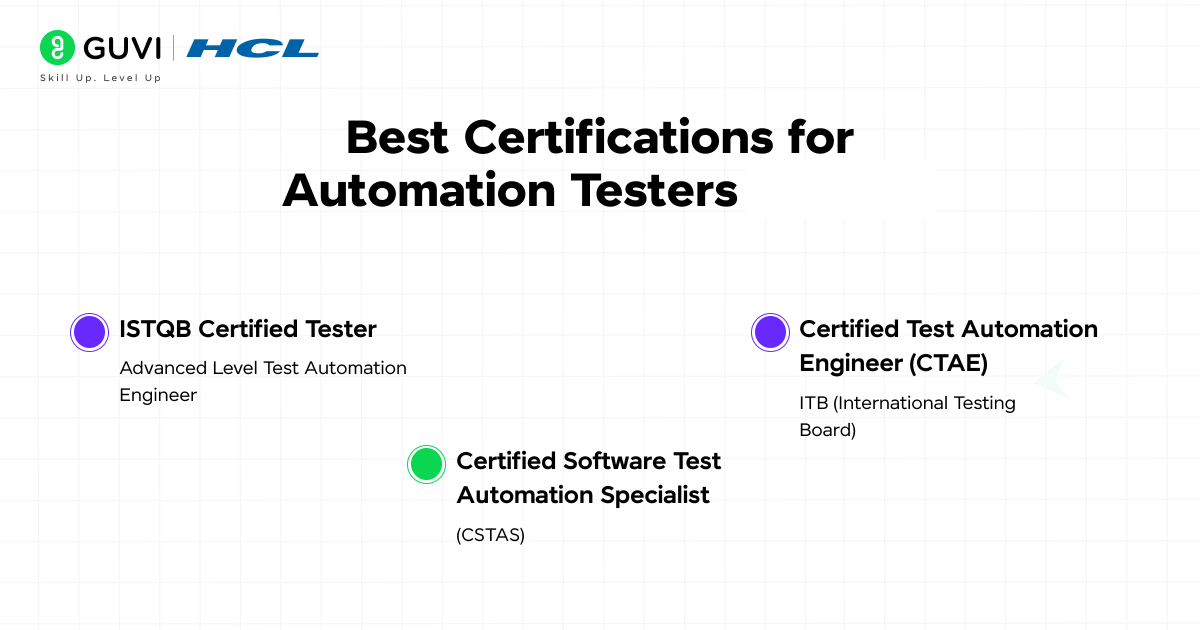
Certifications validate your expertise and enhance your professional credibility. Here are some esteemed certifications to consider:
a. ISTQB Certified Tester – Advanced Level Test Automation Engineer
This certification focuses on designing, developing, and maintaining test automation solutions. It’s globally recognized and ideal for professionals aiming to demonstrate their automation proficiency.
- What You’ll Learn:
- Automation concepts and methodologies
- Design and development of test automation architectures
- Deployment and maintenance of automated test solutions
- Who Should Get This Certification?
- Experienced testers seeking formal recognition
- Automation engineers aiming for career advancement
- Professionals involved in test automation projects
- Link to Certification: ISTQB Test Automation Engineer
b. Certified Software Test Automation Specialist (CSTAS)
The CSTAS certification emphasizes practical skills in automation testing, covering various tools and best practices. It’s suitable for those looking to validate their hands-on experience.
- What You’ll Learn:
- Automation testing fundamentals
- Tool-specific training (e.g., Selenium, QTP)
- Framework development and scripting
- Who Should Get This Certification?
- Testers with practical automation experience
- Individuals seeking to formalize their skills
- Professionals aiming for roles requiring certified expertise
- Link to Certification: CSTAS Certification
c. Certified Test Automation Engineer (CTAE) – ITB (International Testing Board)
The Certified Test Automation Engineer (CTAE) certification is designed to validate expertise in automation testing, including scripting, tool implementation, and automation strategies.
- What You’ll Learn:
- Principles of test automation and tool selection
- Test automation architecture and design patterns
- Scripting techniques and automation best practices
- Integration of test automation with CI/CD pipelines
- Who Should Get This Certification?
- Testers looking to specialize in test automation
- QA engineers aiming to develop custom automation frameworks
- Professionals wanting to implement test automation in Agile and DevOps environments
- Link to Certification: CTAE Certification
3. Best YouTube Channels for Automation Testers
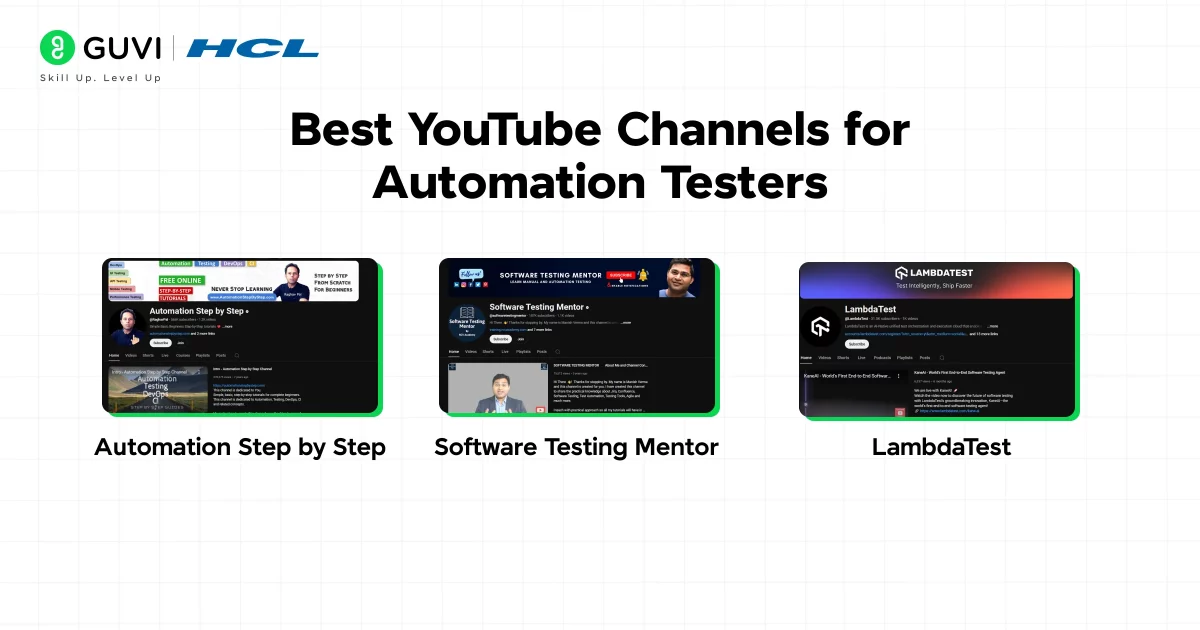
YouTube offers a wealth of free resources for visual and practical learners. Here are some top channels:
a. Automation Step by Step
This channel provides comprehensive tutorials on various automation tools and practices, making complex topics accessible to beginners.
- What You’ll Learn:
- Selenium WebDriver tutorials
- API testing with Postman and RestAssured
- Jenkins CI/CD pipeline setup
- TestNG and JUnit framework concepts
- Who Should Follow This Channel?
- Beginners in automation testing
- Manual testers transitioning to automation
- Professionals looking for structured, easy-to-follow tutorials
- Watch Here: Automation Step by Step
b. Software Testing Mentor
This channel provides in-depth software testing content, including test automation, ISTQB certification preparation, and Agile testing methodologies.
- What You’ll Learn:
- Selenium, Appium, and API automation
- Performance testing with JMeter
- Software testing career guidance
- ISTQB exam preparation
- Who Should Follow This Channel?
- Testers preparing for ISTQB certifications
- Automation professionals looking for tool-specific guidance
- Beginners seeking practical knowledge
- Watch Here: Software Testing Mentor
c. LambdaTest
LambdaTest is a cloud-based testing platform that offers tutorials, expert webinars, and discussions on test automation trends and best practices.
- What You’ll Learn:
- Selenium Grid and parallel test execution
- Cypress, Playwright, and TestNG tutorials
- DevOps and CI/CD integration for test automation
- Latest trends in automation testing
- Who Should Follow This Channel?
- Testers interested in cloud-based automation
- DevOps professionals integrating testing into CI/CD
- Advanced testers looking for high-level concepts
- Watch Here: LambdaTest YouTube Channel
4. Best Books to Build Strong Foundations in Automation Testing
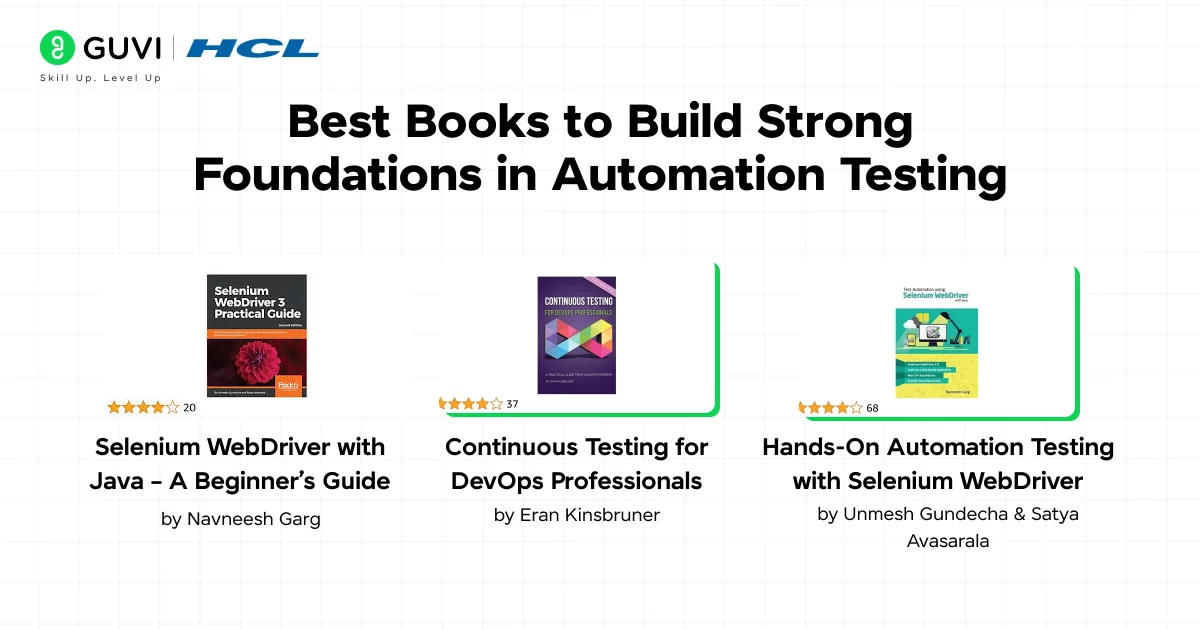
Books are an invaluable resource for gaining in-depth knowledge and mastering the principles of automation testing. Here are some of the best books to read:
a. “Selenium WebDriver with Java – A Beginner’s Guide” by Navneesh Garg
- What You’ll Learn:
- Selenium WebDriver fundamentals
- Java programming for testers
- Framework development (Page Object Model, Data-Driven Testing)
- Real-world automation scenarios
- Who Should Read It?
- Beginners with little or no coding experience
- Manual testers transitioning to automation
- Java developers interested in test automation
- Get It Here: Amazon Link
b. “Continuous Testing for DevOps Professionals” by Eran Kinsbruner
- What You’ll Learn:
- Integrating automation testing into DevOps pipelines
- Best practices for continuous testing
- Mobile and cloud-based testing strategies
- Case studies and industry trends
- Who Should Read It?
- Test automation professionals working in DevOps
- Software engineers integrating testing into CI/CD
- Test architects designing scalable automation solutions
- Get It Here: Amazon Link
c. “Hands-On Automation Testing with Selenium WebDriver” by Unmesh Gundecha & Satya Avasarala
This book provides a practical approach to learning Selenium WebDriver and is ideal for those who want hands-on experience in automation testing.
- What You’ll Learn:
- Core Selenium WebDriver concepts and best practices
- How to build robust and maintainable test automation frameworks
- Integration with TestNG, Cucumber, and Jenkins for CI/CD
- Advanced automation techniques like handling dynamic elements and parallel execution
- Who Should Read It?
- Beginners looking for a step-by-step guide to Selenium
- Manual testers transitioning to automation
- Software testers aiming to build scalable automation frameworks
- Get It Here: Amazon Link
Steps to Begin Your Automation Testing Journey
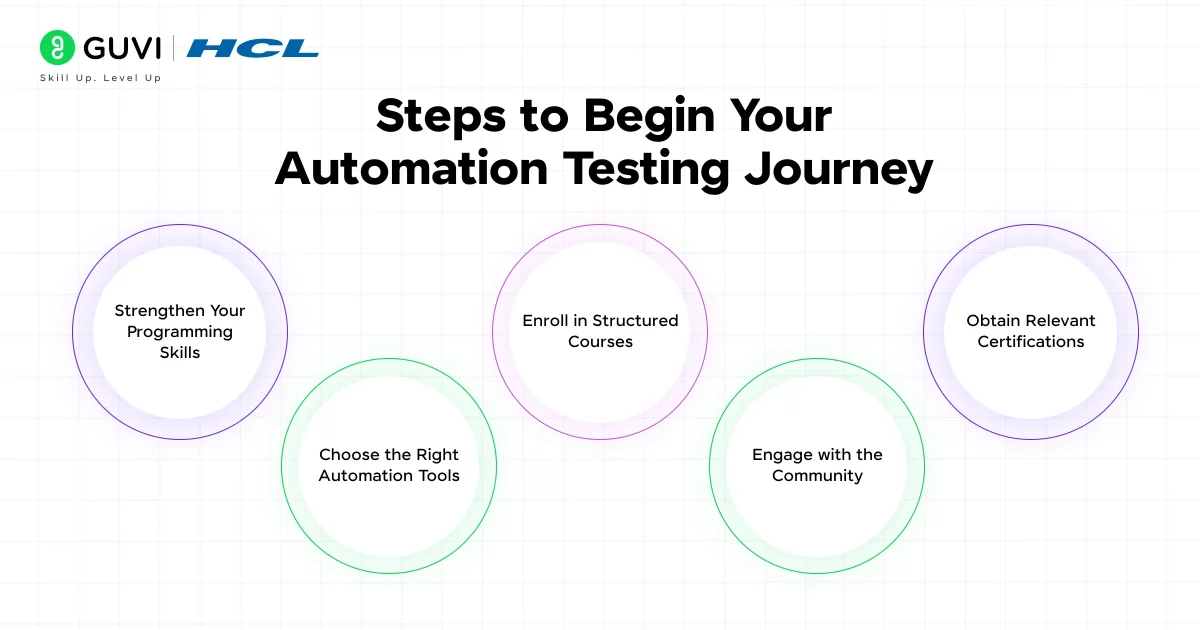
1. Strengthen Your Programming Skills
A solid grasp of programming is essential for creating and maintaining automated tests. While the choice of language depends on your project’s requirements, popular options include:
- Python: Known for its simplicity and readability, making it ideal for beginners.
- Java: Widely used in enterprise environments with extensive community support.
- JavaScript: Essential for web applications, especially with frameworks like Node.js.
2. Choose the Right Automation Tools
Selecting appropriate tools is critical. Factors to consider include the application type (web, mobile, desktop), technology stack, and team expertise. Notable tools are:
- Selenium: Ideal for web applications, supporting multiple browsers and programming languages.
- Appium: Suitable for automating mobile applications across various platforms.
- TestNG: A testing framework inspired by JUnit, designed for test configuration and parallel execution.
3. Enroll in Structured Courses
Formal training can provide a comprehensive understanding of automation testing principles and practices. Consider the following courses:
- Test Automation University: Offers free, community-driven courses on various automation topics.
- Coursera: Provides courses like “Automated Software Testing” that cover fundamentals and advanced concepts.
- Udemy: Hosts a variety of courses on automation tools and frameworks.
4. Engage with the Community
Participating in forums and communities can enhance your learning experience:
- Ministry of Testing: A global community offering forums, meetups, and resources dedicated to software testing.
- Reddit’s r/QualityAssurance: A platform to discuss challenges, share resources, and seek advice from fellow testers.
5. Obtain Relevant Certifications
Certifications can validate your expertise and enhance your professional credibility:
- ISTQB Test Automation Engineer: Focuses on designing, developing, and maintaining test automation solutions.
- Certified Software Test Automation Specialist (CSTAS): Emphasizes practical skills in automation testing.
Conclusion
In conclusion, mastering automation testing is a step-by-step process that involves learning foundational testing concepts, programming, tools, and frameworks. By following structured courses, obtaining certifications, and engaging with communities, you can accelerate your journey and establish yourself as a proficient automation tester.
Whether you’re transitioning from manual testing or starting fresh, the key is to practice consistently, stay curious, and keep evolving with industry trends.
FAQs
Yes, a basic understanding of programming (Java, Python, or JavaScript) is essential for writing automated test scripts.
Selenium WebDriver is the most recommended tool for beginners as it’s widely used for web automation.
Selenium supports multiple browsers and languages, while Cypress is a JavaScript-based tool designed for fast, reliable UI testing.
It depends on your prior experience. With consistent learning, you can gain proficiency in 3-6 months.
Salaries vary based on experience and location. In India, automation testers earn an average of ₹6,00,000 to ₹8,00,000 per year.







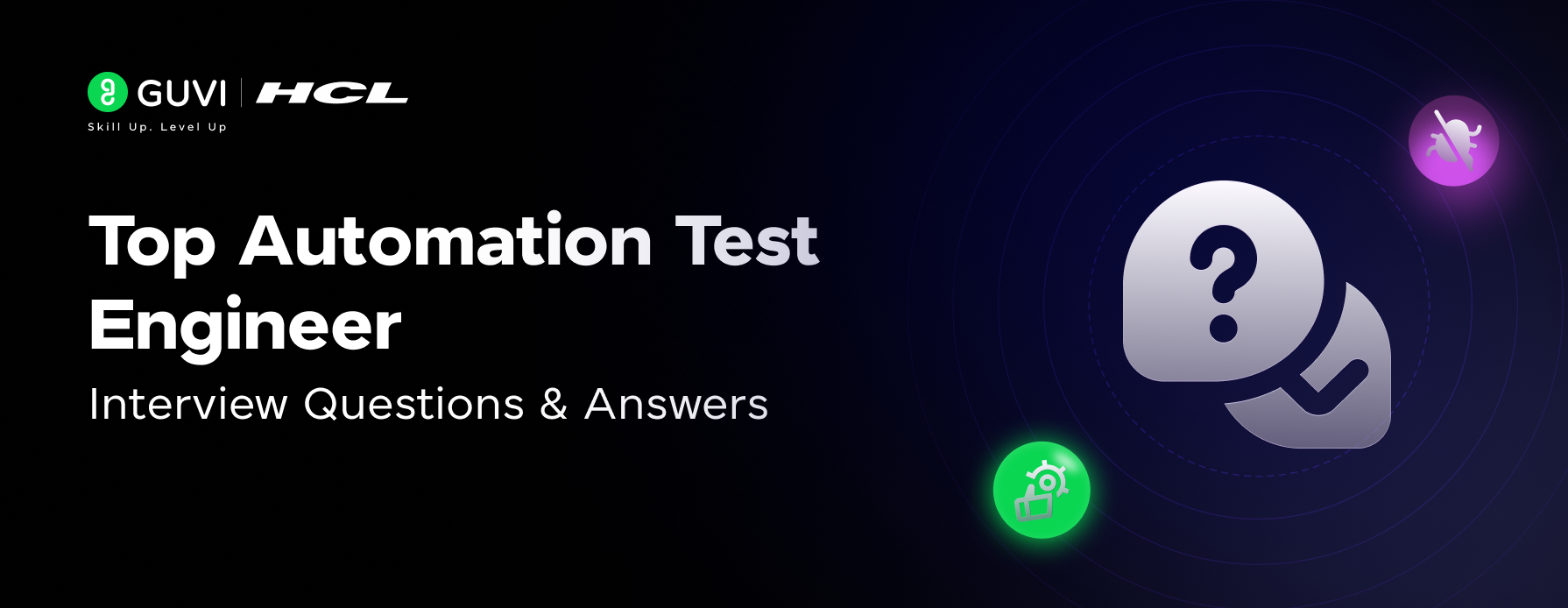



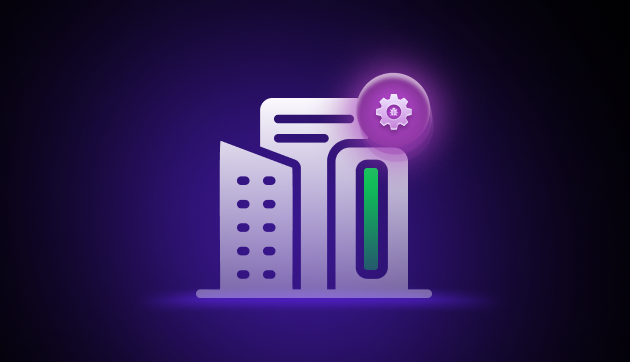

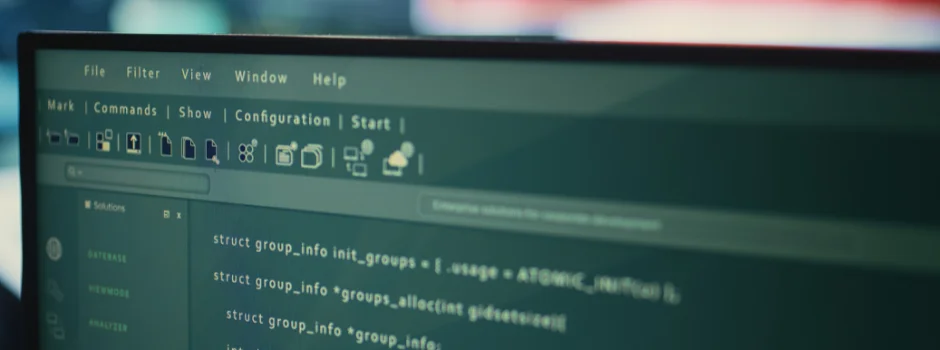






Did you enjoy this article?